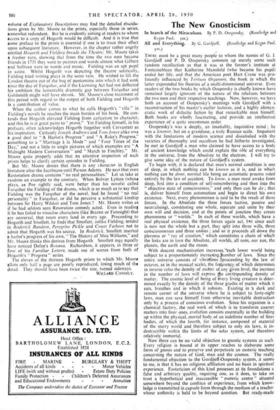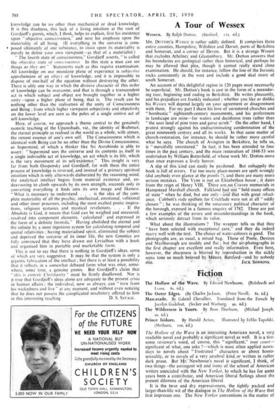The New Gnosticism
THERE must be a great many people to whom the names of G. I. Gurdjieff and P. D. Ouspensky summon up merely some such random recollection as that it was at the former's institute at Fontainebleau that Katherine Mansfield (who became his pupil) ended her life, and that the American poet Hart Crane was pro- foundly influenced by Tertium Organum, the book in which the latter expounded his theories of a multi-dimensional universe. Even readers of the two books by which Ouspensky is chiefly known have remained largely ignorant of the nature of the relations between the two men and their respective teachings. Now, however, we have both an account of Ouspensky's meetings with Gurdjieff with a reconstruction of his master's earlier lectures, and a highly idiosyn- cratic work of didactic fiction by that remarkable man himself. Both books are wholly fascinating, and provide an intellectual experience of a quite uncommon order ' Ouspensky's was a deeply, an insatiably, inquisitive mind ; he was a knower, but on a grandiose, a truly Russian scale. Impatient with the limitations of modern science and dissatisfied with the varieties of theosophy and occultism he had hitherto investigated, he met in Gurdjieff a man who claimed to have access to a body of ancient knowledge, which could explain the role of everything in the universe, from the Absolute to the electron. I will try to give some idea of the nature of Gurdjieff's system.
To begin with, it is declared that man's normal condition is one of sleep, in which nothing can be known as it is, and in which nothing can be done, normal life being an automatic process ruled entirely by the law of accident. To know, a man must awake from sleep, first into a condition of self-remembering and then into the " objective state of consciousness," and only then can he do ; that is, deliver himself from automatism and begin to direct his own existence. Next, every phenomenon is said to be the result of three forces. In the Absolute the three forces (active, passive and neutralising), constituting one whole, separate and unite by their own will and decision, and at the points of junction they create phenomena or " worlds." In each of these worlds, which have a real physical existence, the three forces again act, tit since each is now not the whole but a part, they split into three wills, three consciousnesses and three unities ; and so it proceeds all down the pleroma or " ray of creation," which constitutes a chain of which the links are in turn the Absolute, all worlds, all suns, our sun, the planets, the earth and the moon.
With descent mechanisation increases; 'each lower world being subject to a proportionately increasing umber of laws. Since the entire universe consists of vibrations Xproceeding by the law of octaves, as in the musical scale), the frstniency, of which determines in inverse ratio the density of matter at any given level, the increase in the number of laws will exptess the corresponding density of matter. The cosmic level of being of every living creature is deter- mined exactly by the density of the three grades of matter which it
eats, breathes and in which it subsists. Existing in dark and remote corner of the universe where he is subject to forty-eight laws, man can save himself from otherwise inevitable destruction only by a process of conscious evolution. Since his organism is a chemical factory, the real work of which is to transform coarser matters into finer ones, evolution consists essentially in the building up within the physical, mortal body of an indefinite number of finer bodies, of which the fourth, for instance, composed of material of the starry world and therefore subject to only six laws, is in- destructible within the limits of the solar system, and therefore relatively immortal.
Now there can be no valid objection to gnostic systems as such. Every religion is bound at its upper reaches to elaborate some form of gnosis and to preserve and perpetuate an esoteric teaching concerning the nature of God, man and the cosmos. The really fundamental objection to the Gurdjieff-Ouspensky system, it seems to me, is that it has no religious affiliation and no basis in spiritual experience. Esotericism of this kind possesses at its foundations a false and arbitrary quality, requiring one, as it does, to take on trust a hypothetical and inaccessible " esoteric centre " situated somewhere beyond the confines of experience, from which know- ledge is transmitted in capsule form through the medium of a teacher whose authority is held to be beyond question. But ready-made
knowledge can be no other than mechanical or dead knowledge. It is this deadness, this lack of a living intuition at the root of Gurdjieff's gnosis, which, I think, helps to explain, first his insistence upon "objective consciousness," and next his emphasis upon the materiality of all being. (If everything in the universe is cony
* posed ultimately of one substance, to insist upon its materiality is merely to define your own viewpoint—as that of a materialist.)
" The fourth state of consciousness," Gurdjieff asserts, " is called the objective state of consciousness. In this state a man can see things as they are" Statements such as this require examination. All knowledge on our mundane. plane of experience is subjective apprehension of an object of knowledge, and it is impossible to dispose of one-half of the equation without destroying the other. There is only one way in which the divisive character of this order of knowledge can be overcome, and that is through a transcendent act in which subject and object are brought together in a higher unity—upon a higher plane of being, that is. The result can be nothing other than the realisation of the unity of Consciousness and Being ; from which higher viewpoint subjectivity and objectivity on the lower level are seen as the poles of a single unitive act of self-knowledge.
Here, of course, we approach a theme central to the genuinely esoteric teaching of the Upanishads, viz., the identity of Brahman, the eternal principle as realised in the world as a whole, with atman, the inmost essence of one's own self. The Consciousness which is identical with Being can be no other than the Divine Consciousness, or Supermind, of which a thinker like Sri Aurobindo is able to assert: " Supermind sees the universe and its contents as itself in a single indivisible act of knowledge, an act which is its life, which is the very movement of its sel(-existence." This insight is very far from both Ouspensky and Gurdjieff, for with them the entire process of knowledge is reversed, and instead of a primary spiritual intuition which is only afterwards elaborated by the reasoning mind, the analytical intellect begins from material existence and, en- deavouring to climb upwards by its own strength, succeeds only in converting everything it finds into its own image and likeness. " What is necessary to understand . . . is the idea of the com- plete materiality of all the psychic, intellectual, emotional, volitional and other inner processes, including the most exalted poetic inspira- tions, religious ecstasies and mystical revelations. . . . If the Absolute is God, it means that God can be weighed and measured, resolved into component elements, ' calculated ' and expressed in the form of a definite formula." Having abolished the eternal and the infinite by a most ingenious system for calculating temporal and spatial relativities ; having materialised spirit, eliminated the subject and deprived the universe of its inner life, the new Gnostics are fully convinced that they have drawn out Leviathan with a hook and organised him in portable and marketable form.
This is not to say that there is nothing in Gurdjieff's ideas, some of which are very suggestive. It may. be that the system is only a gigantic fabrication of the intellect ; but there is at least a possibility that it reflects, in a somewhat debased form what was once, some- where, some time, a genuine gnosis. But Gurdjieff's claim that " this is esoteric Christianity" must be firmly disallowed. Nor is it true that Gurdjieff's ideas alone are adequate to the present crisis in human affairs ; the individual, now as always, can " turn from his wickedness and live " at any moment, and without even noticing that he does not possess the complicated machinery offered to him











































 Previous page
Previous page